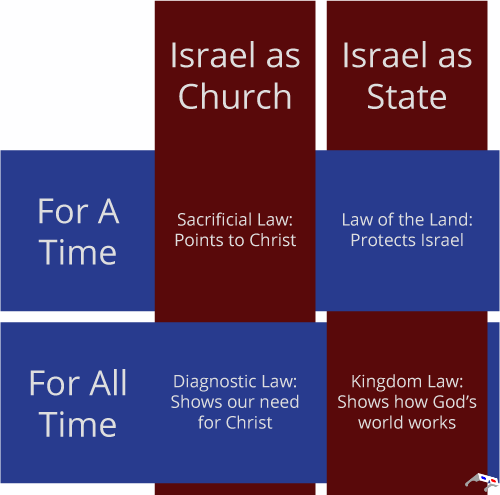Many times when people (Christians and unbelievers alike) misunderstand or misapply the word of God in the Bible, it’s because they view the commands of God incorrectly. Either they assume that an Old Testament law doesn’t apply anymore, or they bring up some obscure verse from Leviticus about people with questionable parentage being unfit for leadership.
That’s understandable when you consider there are four types of laws handed down to Israel. To understand them better, you can look at them as a grid:

Let’s talk about the columns and rows first, and then we’ll investigate each quadrant in particular.
Contexts and Durations of Command
Israel was called by God as both a church and a state, and so the laws must be viewed in the context they were given.*
- Israel as Church – The first column contains ceremonial laws passed down by God to govern how His people worshiped.
- Israel as State – The second column contains civil laws that God handed down to keep His nation running the way He intended.
Similarly, the Bible was written to specific peoples in a specific time, but it was intended to apply to all peoples in all times and places. So the laws must be viewed in light of the duration they were intended.
- For A Time – The top row contains laws that God introduced to apply to His people for a period of time, but which have been fulfilled. The principles behind these laws are still valid, but the laws themselves no longer bind us.
- For All Time** – The bottom row contains laws that God commands directly to us, and every human that has ever lived. These laws will not be fulfilled until we are sanctified and able to keep them perfectly.
The Four Types of Laws
- Sacrificial Law (top-left quadrant): Laws regarding sacrifice offerings (including much of Leviticus) were given to Israel as Church, and intended For A Time. They “prefigure” Christ as the perfect sacrifice for all of our sins on the cross, as He followed and fulfilled all of those laws perfectly when He was crucified. We are no longer bound by these laws, since Christ has fulfilled them, but when we read them in the Bible, it’s important to remember what a big deal our sin is: the plan to deal with it took up reams of the law and an entire tribe of priests.
- Law of the Land (top-right quadrant): The laws that God passed down about how they were to deal with neighboring nations and internal conflict (many of the Bible’s laws regarding slavery fall into this category) were given to Israel as State, and intended For A Time. They protected Israel and her people from invasion by other nations, as well as protecting the nation from descending into chaos through infighting and injustice. When Jesus came to Earth and instituted His Kingdom by dying on the cross, these laws were fulfilled; we are no longer bound by them.
- Diagnostic Law (bottom-left quadrant): God’s commands to His people to worship Him are evergreen. We are to approach Him with thanksgiving and praise; to sing a new song to Him (or at least make a joyful noise). But in the first four of the Ten Commandments, His laws about worship are clear: we are not to worship any god above Him, make idols, take His name in vain, or ignore the Sabbath. It’s impossible for fallen men to keep these laws perfectly; God gave them in order that we would see our need for Jesus and repent before Him. We are still bound to follow them: and the fact that we can’t proves that we still need Jesus.
- Kingdom Law (bottom-right quadrant): God didn’t just create this world and hope everything went the way He wanted it to. He gave us laws for the way He wanted us to operate in this world; in the last six of the Ten Commandments, God calls us to perfection in the way we treat others. Jesus, similarly, insisted that we love one another. This type of law can be summed up like a family, where the father says “this is the way we do things in this family.” And the biggest answer to that is love.
Clarity and Understanding
Please don’t hit anyone over the head with the “For A Time” laws; that’s silly and unhelpful. The purpose of theology is to reveal your heart, draw you to God, and make you more like Christ. I hope this little model of Biblical laws helps you do that.
• • •
* There are some laws that fall on both sides of this divide, and there are many whose status is debated. Since God formed Israel as both church and nation, trying to separate them out is something like trying to identify the constituent pieces of a cake after it has been baked.
** Many theologians categorize both bottom quadrants of “For All Time” laws together as “moral laws.” Far be it from me to disagree with more intelligent men and women than myself, but I find it helpful to look at them separately so that it is easier to see the purposes behind them.

